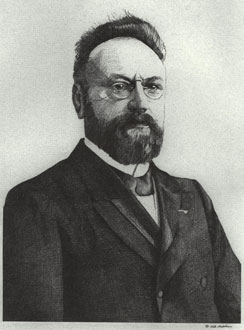Herman Bavinck on Education


One of the hats I wear is that of a sessional lecturer in church history at Covenant Canadian Reformed Teachers College. Tomorrow I’ll be lecturing on Herman Bavinck and I’ll also be discussing his contributions to educational philosophy. Here’s an excerpt from my lecture notes:
Also, I want to spend a few moments on Bavinck’s views of education. As mentioned earlier, he did a lot of work in this area. He was an educator at the seminary level, but he was also interested in the philosophy behind education at every level. He wrote at least three books on the topic, plus numerous essays and articles. He was among the pioneers of careful Reformed thinking about the philosophy of education. Unfortunately, nearly everything Bavinck has written on this subject is still in Dutch. We do have a couple of books in English about Bavinck’s educational philosophy. One of them is Cornelius Jaarsma’s 1935 book, The Educational Philosophy of Herman Bavinck: A Textbook in Education.[1] Following Jaarsma, let me just summarize three of Bavinck’s contributions to this area.
Bavinck was conversant with contemporary educational philosophy in general. For instance, he had read John Dewey and was quite familiar with his views. Bavinck recognized the antithesis in educational philosophy. He saw that Dewey and others represented a man-centered (anthropocentric) approach to education. Instead of that, Bavinck insisted that we need to maintain a God-centered (theocentric) educational philosophy.[2]
Another interesting element of Bavinck’s educational philosophy was his view of the one to be educated. This brings him to the subject of creation and evolution. Jaarsma summarizes Bavinck’s position like this: “Bavinck proceeds from the creative principle rather than that of biological evolution. He fails to find adequate evidence in biology, archaeology, geology, etc. that man finds his progenitors in lower animal forms.”[3] Man is a special creation of God. Here too, he insists on the antithesis. Jaarsma again:
Man is either a creation of God or a descendant of lower animal forms. One who rejects the former, must resort to the latter, not because of adequate evidence, but as one’s only alternative. If man is a developed form of animal life, he remains an animal, and brute nature will always remain with him in some form. Education then becomes a process of embellishment in eugenics and euthenics. ‘Man’s animal origin is no more than an hypothesis, and really no more than an opinion of the present day.’[4]
Instead, Bavinck insisted that man was a special creation of God and that humanity not merely possesses or bears the image of God, but is the image of God. Education then is the purposeful process of perfecting man in the image of God.[5]
Finally, Bavinck also reflected on the ethical element of educational philosophy. He recognized that education also has a behavioural component. Here again, he draws out the antithesis between a biblical approach to education and that of secularists in his time. Bavinck wrote, “Modern education in various ways has undermined the authority of parents, has made the child the center of all education, has exchanged the moral relationship of teacher and pupil for that of contact.”[6] Modern educators follow the thinking of Pelagius and assert the inherent goodness of human nature. A Reformed and biblical view of education proceeds from a position that takes total depravity and original sin seriously. Children need discipline. However, mostly for practical reasons, Bavinck was not an advocate for corporal punishment in schools. He was also aware of how corporal punishment has become abusive. Other means should be found to keep children in line and they should be: 1) geared towards the individual, and 2) positively geared towards correction.[7] But we need discipline as part of our education, because discipline teaches self-control, and self-control is the way to true freedom.
Now there is much more that could be said about Bavinck’s educational philosophy. I’ve just hit on three of the more interesting points. If you want to find out more, read Jaarsma’s book.
[1] There is also J. Brederveld, Christian Education: A Summary and Critical Discussion of Bavinck’s Pedagogical Principles (1928). The English book, Essays on Religion, Science and Society has a couple of shorter writings of Bavinck on education as well.
[2] Jaarsma, The Educational Philosophy of Herman Bavinck, 134.
[3] Jaarsma, The Educational Philosophy of Herman Bavinck, 149.
[4] Jaarsma, The Educational Philosophy of Herman Bavinck, 140-141.
[5] Jaarsma, The Educational Philosophy of Herman Bavinck, 215.
[6] Jaarsma, The Educational Philosophy of Herman Bavinck, 172-173.
[7] Jaarsma, The Educational Philosophy of Herman Bavinck, 173.


